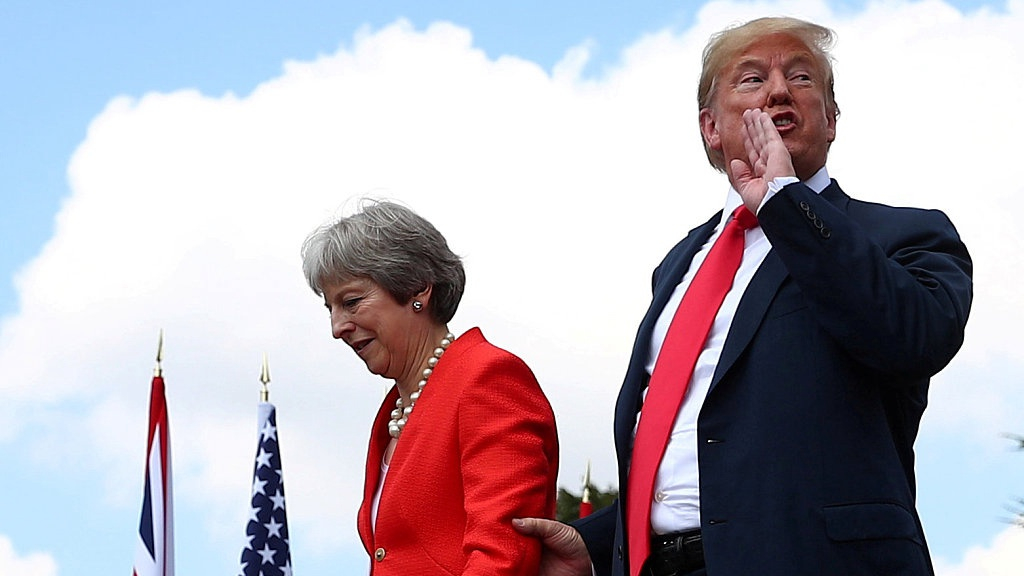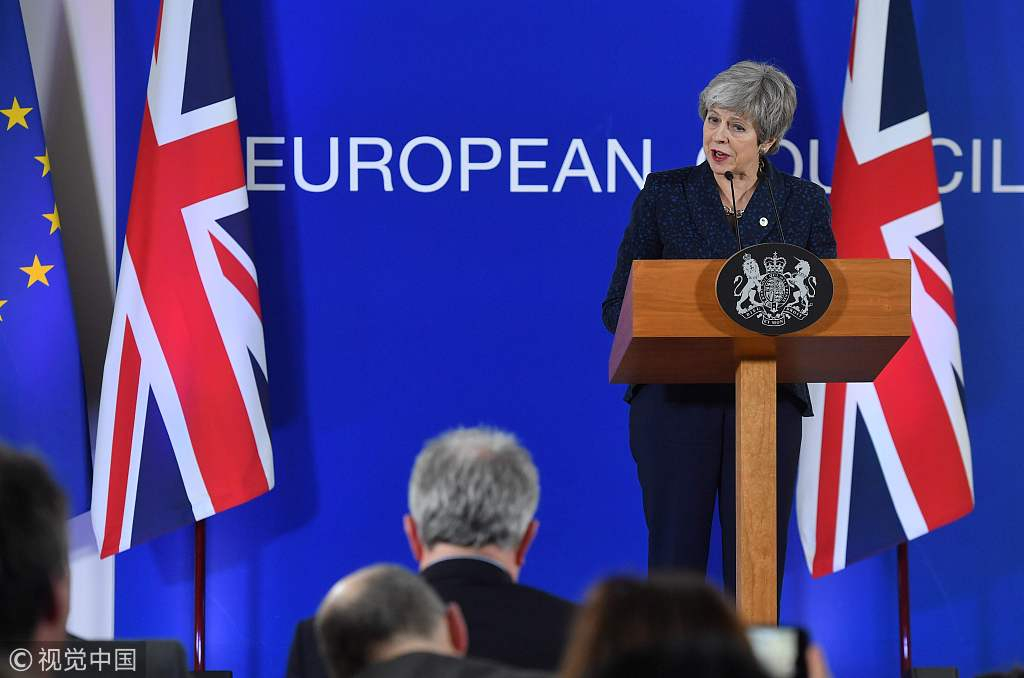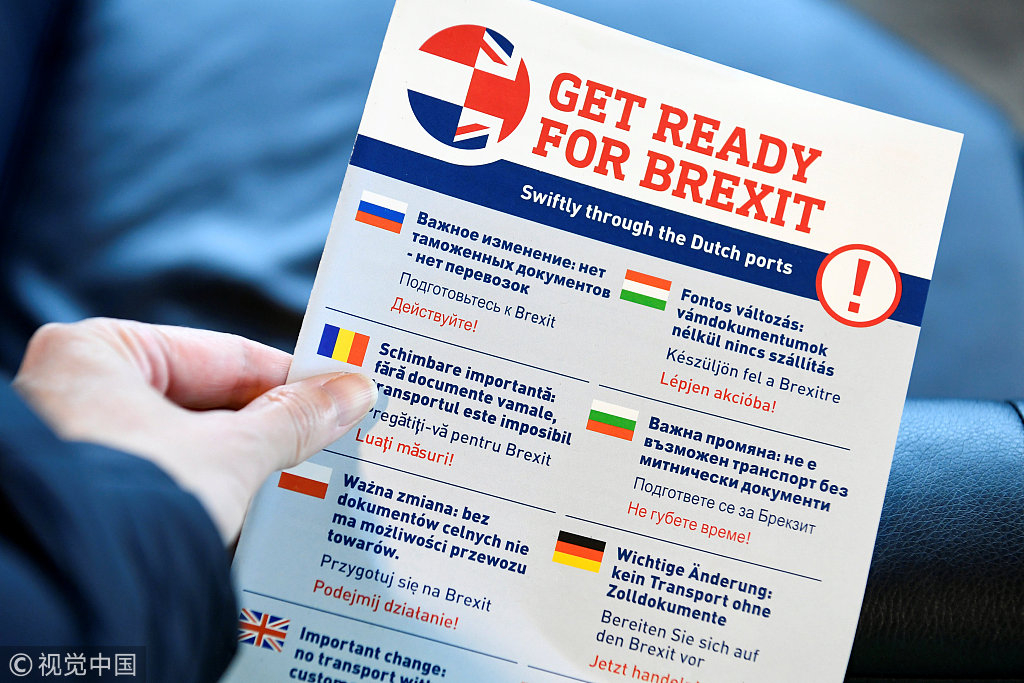
Opinion
14:30, 22-Mar-2019
In or out, UK remains a strong U.S. partner
Updated
15:34, 22-Mar-2019
Tracy Chen

Editor's note: Tracy Chen is an assistant research fellow from The School of International Development at UEA. The article reflects the author's opinion, and not necessarily the views of CGTN.
The special relationship between the United Kingdom and the United States is built on deep-rooted economic, foreign policy and security relations. The durability of this alliance of the two countries stems from the shared democratic norms, commitment to the rule of law and free enterprise.
In 2016, the UK voted to leave the European Union, triggering a separation process. But British Prime Minister Theresa May's Brexit plan has failed in Parliament, after the body voted it down twice. Now, the EU has agreed to delay Brexit plan and MPs are expected to vote for the withdraw deal the third time next week. But it's still possible that the UK could face a disastrous no-deal divorce.
Unlike a hard Brexit, which means leaving both the single market and the customs union and could theoretically include some type of agreement with the EU, in a no-deal scenario, the UK would be subject to WTO rules and its exports would face the same customs checks and tariffs as other countries outside of the EU. Without a 21-month transition period, businesses, consumers and public bodies would have to respond immediately to changes when the UK leaves the EU.

British Prime Minister Theresa May holds a press conference at the end of the first day of an EU summit focused on Brexit, in Brussels, March 22, 2019. /VCG Photo
British Prime Minister Theresa May holds a press conference at the end of the first day of an EU summit focused on Brexit, in Brussels, March 22, 2019. /VCG Photo
Economists around the world have repeatedly warned against a hard Brexit and if “no-deal Brexit” is the final choice, many believe that the situation would be even more catastrophic. However, no matter what shakes out, Brexit still enjoys strong support from the Trump administration.
During his 2016 presidential campaign, U.S. President Trump openly supported Brexit and now the U.S. has made it clear that it is ready to enter into a beneficial bilateral trade relationship with the UK.
The U.S. is now Britain's top trading partner. Today over 42,000 American firms export to the UK and the U.S. exported 123 billion U.S. dollars of goods and services to the UK, the second largest source of imports of UK. Both countries are the largest investor in each other's market.
Since the establishment of the EU in 1993, many U.S. companies have used the UK as a gateway to trade with other EU countries. For American companies, the UK is a safe and certain market in an increasingly uncertain world. With Brexit, barrier-free trade access through Britain will end and U.S. businesses will have to establish new operations and offices in other EU countries.
Theoretically, the United States could begin negotiations with the UK when it exits the EU and the Trump administration appears ready to do so. But without a clear timetable, the UK cannot formally negotiate trade agreements until it leaves the EU and the EU has the sole trade negotiating authority for trade agreements with third countries.

A leaflet on how cargo can be transported quickly via Dutch ports after Brexit in Vlaardingen, Netherlands March 13, 2019. /VCG Photo
A leaflet on how cargo can be transported quickly via Dutch ports after Brexit in Vlaardingen, Netherlands March 13, 2019. /VCG Photo
But many still believe that, in the long run, the UK's breaking free from Brussels would provide a tremendous impetus to a U.S.-UK free trade agreement, further enhancing the special relationship between the two of the world's top five economies. The promising agreements with the U.S. could help strengthen the UK's foothold in future negotiations with the EU on the terms of Brexit and also have an influence on the UK's post-Brexit economic relationship with the EU.
For a long time, the UK has been the major supporter of the U.S. on numerous U.S.-EU issues, helping the U.S. to communicate effectively with Europe and NATO on its concerns. The United States has an intimate intelligence-sharing relationship with the UK in areas like counterterrorism, national security, data privacy, anti-trust matters and U.S. sanctions against Iran, Russia and other countries.
UK officials have stressed on many occasions that Brexit does not mean a turn toward isolationism and the UK remains an important global leader in international diplomacy, trade and finance, security issues, and development aid. The UK has been and will be a strong partner of the U.S. in operations in Iraq and Syria. An extension of Brexit or a no-deal Brexit, it is unlikely to cause a dramatic change in most aspects of the UK-U.S. relationship.
(If you want to contribute and have specific expertise, please contact us at opinions@cgtn.com)

SITEMAP
Copyright © 2018 CGTN. Beijing ICP prepared NO.16065310-3
Copyright © 2018 CGTN. Beijing ICP prepared NO.16065310-3